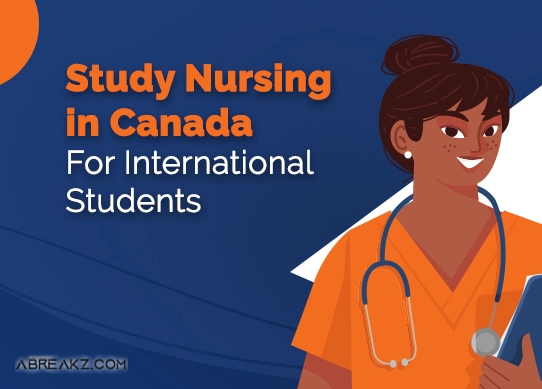Canada has one of the world's leading healthcare systems. Nurses there form the backbone of the medical industry, and studying nursing in Canada is very competitive.
Canada has one of the world's leading healthcare systems It is also very popular there and many Canadian universities and schools offer it. Approximately 8.5% of all registered nurses in Canada are foreign nationals and earn over $150,000 a year. But the application process can become costly with registration fees and other costs that you may not have planned for. In this article, we will learn about all the details of studying nursing in Canada, and we will also inform you about many schools and nursing programs in Canada at the end of the article.
Study Nursing in Canada

Why study nursing in Canada:
There are many reasons why studying nursing in Canada is among the best in the world, and among these reasons are the following:
Canada includes many of its universities in the rankings of the world's best universities in the field of nursing according to the 2021 QS rankings.
It provides world-class education and training, and also offers globally recognized nursing degrees.
When studying nursing in Canada, the main focus is on providing students with practical experience in treating diseases, preventive medications, treating various diseases, and more.
Medical universities and nursing schools in Canada are also known for research and development and have international collaborations with health organizations from all over the world to give the best offer to students.
Top Majors for Nursing Courses in Canada:
There are over 100 nursing courses with different majors and degrees offered by top colleges in Canada. Students can choose from a certificate or diploma program for a doctoral degree in a variety of disciplines in the field. Here are some of the most important majors available for nursing courses in Canada:
Practical nursing.
General Nursing.
International Nursing.
Nursing assistance.
Pre-health sciences.
Critical Care Nursing.
Pediatric Nursing.
Nursing and midwifery.
Nursing specialist.
Cardiac nursing.
Emergency Nursing.
Medical surgery.
Gastrointestinal Nursing.
Public Health.
Furthermore, after completing your chosen course and based on your major, you can create nursing jobs in areas such as:
health care centers.
medical institutes.
Hospitals.
community services.
Long-term care/critical care institutions.
Eligibility criteria:
In order to be able to apply for nursing courses in Canadian universities, there are some conditions and requirements that must be met, although the course requirements differ from one university to another and from one program to another, but these are the general eligibility criteria that all nursing universities in Canada share:
For Bachelor’s Degree Nursing courses in Canada, the candidate must have completed his high school graduation or equivalent with Mathematics, English, Biology and Chemistry as core subjects at 12th level.
For master's degree courses, the candidate must have a registered nurse license with a 4-year bachelor's degree in nursing in addition to other eligibility criteria. Furthermore, many universities also require at least one year of clinical experience.
As for doctoral programmes, the applicant must have a master's degree in nursing or its equivalent.
Language proficiency scores from PTE, TOEFL or IELTS must also be submitted. Furthermore, for doctoral programmes, some nursing colleges or universities may require GRE scores and for a bachelor’s degree, you may have to take the CASPer test, i.e. computer-based assessment of sampling of personal characteristics which is mandatory by many academic institutions in Canada.
Required Documents :
Here is a checklist of documents that you should have ready before choosing nursing courses in Canada:
Language proficiency test scores (TOEFL, IELTS).
Official documents.
Statement of Purpose (SOP) and letters of recommendation.
CASPer Exam Document for Bachelor's Degree Courses.
Registered Nursing License (current RN) for master's degree courses.
Research paper (in case, if you have done any research) for PhD courses.
Note: The above eligibility requirements and required documents are only for indicative purposes and comply with the general requirements. Students are therefore advised to go to the official website of their chosen university to find out the actual course requirements.
What languages are taught in nursing programs in Canada?
English is the official language in most Canadian institutions of higher education. But there are a few courses that are taught in French or both. Therefore, you must check the language of the course before applying to it so that you can prepare your papers in a large way and not waste time.
Best Nursing Universities in Canada:
University Ranking of the university in the world in the subject of Nursing
University of Toronto 12
University of Alberta 14
McMaster University 15
University of British Columbia 27
McGill University 32
University of Calgary 50
Université de Montréal 51 – 100
University of Ottawa 51 – 100
Western University 51 – 100
Dalhousie University 101 – 150
Queen’s University at Kingston 101 – 150
University of Manitoba 101 – 150
The cost of studying nursing in Canada:
The costs of studying nursing in Canada vary depending on the level of study and the institution you wish to attend, but generally you will need between 20,000 – 30,000 Canadian dollars annually to meet the tuition fees.
Before your application is approved, you will need to demonstrate that you can afford all annual expenses. Remember that this exceeds the tuition fee because you will need more money for housing and other basic needs. If you decide to live off campus, the apartment will cost you at least CAD 1,000 per month. Food will cost you about C$500, and transportation will cost you about C$150 per month. But all of these costs depend on the city you choose to live in.
International students are allowed to work while studying in Canada. However, you are only eligible for this privilege if your study permit includes this requirement. As such, you may not need to obtain a work permit to work on or off campus. The money you get in Canada can be used to pay your monthly expenses.







































